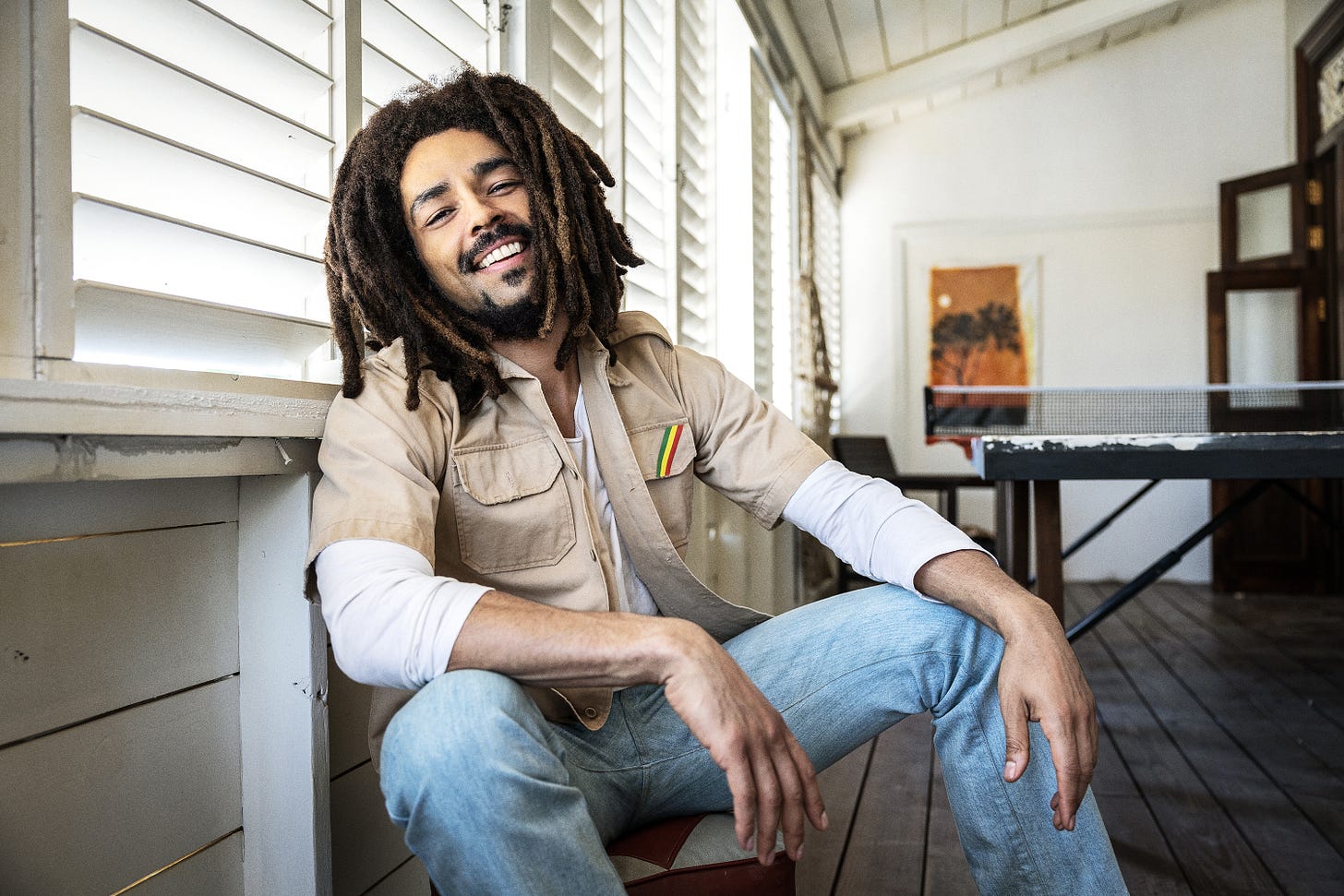'Bob Marley: One Love' is a middling music biopic
The film struggles to have a unifying thing to say about its subject- but Kingsley Ben-Adir shines, while the songs are well-presented
Bob Marley was a transcendent musical talent, rising from Jamaica to worldwide fame throughout the late 1970s, on the back of such classic songs as “No Woman No Cry,” “Get Up Stand Up,” “One Love,” “Three Little Birds” and “I Shot the Sheriff.” His music endured long after his 1980 death, and his “Legend” greatest hits album was played ubiquitously in my college dorm throughout the late ‘90s.
Now, we have Bob Marley: One Love, the first major biopic of Marley, made with the cooperation of the late star’s extended family. It’s a film that repeats various cliches of music biopics, which is helped a bit by a superb performance by Kingsley Ben-Adir as Marley, and fine presentations of those great songs. But what it doesn’t do is put together anything specific to say about who Bob Marley was.
The film doesn’t tell Marley’s life story from cradle to grave; despite some flashbacks to Bob’s childhood and his embrace of Rastafarianism, the film mostly covers the last four years or so of Marley’s life, focusing on the making and touring behind the “Exodus” album.
Bob Marley: One Love is directed by Reinaldo Marcus Green, who last made King Richard; I do give him credit for, this time, actually making a biopic of Bob Marley rather than one of Bob Marley’s dad. There are also four credited writers, including Green and Sopranos/Boardwalk Empire/Wolf of Wall Street writer Terence Winter.
The film begins in 1976 in Jamaica when Marley was a major star in his home country but not yet a superstar internationally. We’re told that there are tensions between a pair of political factions in the country that have spilled into violence, that Marley is planning to stage a peace concert to bridge the sides, and that members of the factions are mad at him for that, to the point of carrying out an assassination attempt.
What do the two factions believe? What is their disagreement about? What does Marley believe personally? These are questions that go almost completely unexplained and unexplored by the film.
In reality, one party was leftist, while the other was pro-U.S., while Marley was officially neutral but suspected of loyalty to the leftist side; the gunmen were a drug gang thought to have ties to the pro-U.S. party. There’s even a conspiracy theory that the CIA somehow gave Marley cancer. It’s fascinating stuff that I would have loved to see the film explore. As it stands, we’re given the impression from the film that Marley’s only stated political beliefs were support for peace and love.
The bulk of the film takes place after Marley and his band, the Wailers, fled to London and began working on the “Exodus” album, and the scenes of them writing and recording are the film’s best, recalling the “Pet Sounds” recording sessions in Bill Pohlad’s Love and Mercy.
We see the band touring, and arguing about whether their next tour stop will be the U.S. or Africa. (While we see Marley playing soccer, the London scenes sadly leave out the singer's reputed support of Tottenham Hotspur.) While the film makes a big deal about Marley’s deep desire to perform in Africa, the film struggles to pay this off, only mentioning in a closing-credits title that he eventually did.
Yes, it has some scenes that seem lifted straight from Walk Hard, especially the part where he thinks about his entire life before going on stage at the end. There’s also that scene, previously used in Bohemian Rhapsody when the band argues with a record company suit, and everything that happens the rest of the movie proves they were right and he was wrong (this time, rather than Mike Myers, the exec is Michael Gandolfini, son of James.)
I was afraid that a Marley biopic made with the cooperation of the family would sand down certain things. Still, the film ignores neither the massive amount of marijuana usage by Marley and his circle nor Marley’s prodigious number of out-of-wedlock children (Bob and his wife Rita, well-played by Lashana Lynch, argue about it at one point; the “Family” section on Marley’s Wikipedia page is long and complex.) The film also has no shyness about featuring Jamaican patois, even if those less-than-versed might have trouble understanding what’s being said.
Kingsley Ben-Adir has played such icons as Barack Obama, Malcolm X, and now Marley — as well as one of the Kens in Barbie last year — although he’s British and none of them are. He’s also, at 37, roughly the age Marley was when he died, although he looks much younger. As for the supporting cast of Wailers and family members, none come across as established characters, with Marley’s large brood of children off-screen most of the time.
Fans of Bob Marley will probably appreciate One Love, on some level, if only for a chance to hear all those great songs. But the film does nothing to transcend the biopic genre or provide any special insight into who Bob Marley was.






I gotta know: did the wrong son die?